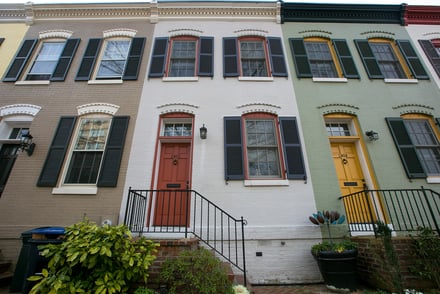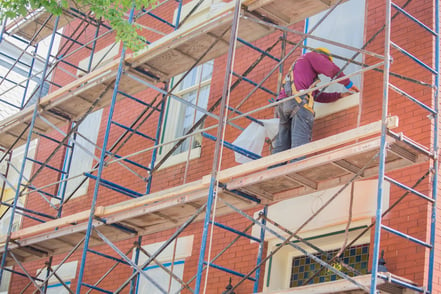Renaissance Development performs historic interior and exterior masonry work, and on hardscapes throughout the DC and surrounding areas. Renaissance Development always handles obtaining any necessary permits that pertain to our work for clients – you are never left to do this on your own. Nevertheless, there are benefits to understanding the basics of the permitting process.
When it comes to home improvements, many homeowners choose to become familiar with the permitting process because they are ultimately responsible for seeing that the appropriate permits are obtained for any work performed on their property. Most reputable contractors handle the actual process of obtaining permits, and a licensed contractor might be needed to obtain some types of permits. However, the homeowner would be the one responsible for any fees or penalties for violations.
For this reason, it's worthwhile to become informed about the process and ensure that the proper permits are obtained. This handy guide will answer some of the most basic questions about permits for home renovations and improvements in Washington, DC.
What is a Construction Permit?
A construction or building permit is a written legal authorization for construction or renovation issued by the District of Columbia Regulatory Affairs commission or DCRA. Permits are required for most construction or remodeling projects to ensure the safety of the work and its compliance with building, construction, and zoning codes.
When Is a Permit Needed or Not Needed?
According to the laws of Washington DC, homeowners need a permit for the following projects:
- New construction and foundations
- Additions, alterations, or repair of existing buildings
- Demolition
- Razes
- Construction of retaining walls, fences, sheds, garages, or vault construction
- Erection of signs or awnings
- Layout of interior space new or existing commercial buildings
Unless you are in a historic district, the following work does not require a building permit:
- Brick pointing
- Caulking, patching, and plaster repair of nonrated assemblies
- Installation of window screens and storm windows
- Repair in kind of existing fences
- Painting other than fire-retardant paint
- Papering, tiling, carpeting, floor covering, cabinets, countertops, and similar finish work
Another category of improvements that do not require permitting unless you are in a historic district are replacements in kind. These include:
- Roofing and coping
- Siding
- Gutters and downspouts and fascia
- Private sidewalks and driveways
- Patios
- Nonrated suspended ceiling tile
- Not more than 160 square feet (14.9 m2) of gypsum board, excluding installation of fire-rated gypsum wallboard or shaft liner
- A single garden storage unit (guidelines apply)
- Prefabricated pools (guidelines apply)
- Retaining walls (guidelines apply)
- Shade cloth structures constructed for nursery or agricultural purposes, not including service systems.
- Swings and other playground equipment for one- and two-family dwellings.
- Movable fixtures, cases, racks, counters, and partitions not over 5 feet 9 inches (1753 mm) in height.
Additional Permits
Your project may require additional permits such as Supplemental Systems Installation (A/C, electric, plumbing, etc.) and Water or Sewer Excavation (pipe installation, water main connections, etc.). You should consult with your contractor concerning these permits.
Historic Districts
Some projects will require a permit because the properties are located within a historic district. This permit is a "Historic Property – Special Permit." These projects include:
- Brick Pointing
- Repair or replacement of fences, except as deemed an ordinary repair
- Painting of unpainted exterior masonry at a landmark property
- Replacement of: Roofing and coping, Siding - Gutters and downspouts and fascia, Private sidewalks and driveways, Patios
- Garden storage shed
- Prefabricated pools
- Retaining walls
Any specific questions regarding permits should be directed to the Washington DC Department of Consumer and Regulatory Affairs.
How Do I Obtain a Permit?
As of February 2020, all permits can be obtained online through the DCRA portal, including paying the appropriate fees. Fees are determined according to the size of your project. Some permits are almost instant, while others may require a minimum 30-day review. Homeowners can consult with their contractors about obtaining permits or visit the online Homeowner's Center to explore more about obtaining the necessary permits.
Renaissance Development is an experienced contractor that performs maintenance and repair of interior and exterior masonry, concrete work, and hardscapes throughout the DC and surrounding areas. We specialize in exterior tuckpointing on older, historic brick homes and other structures to preserve building integrity. Contact us about all your concrete or masonry needs.
5/26/22 8:00 AM

